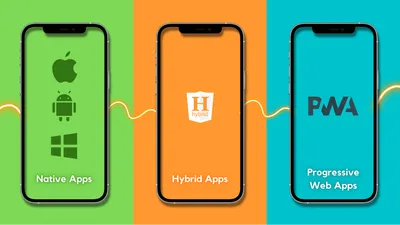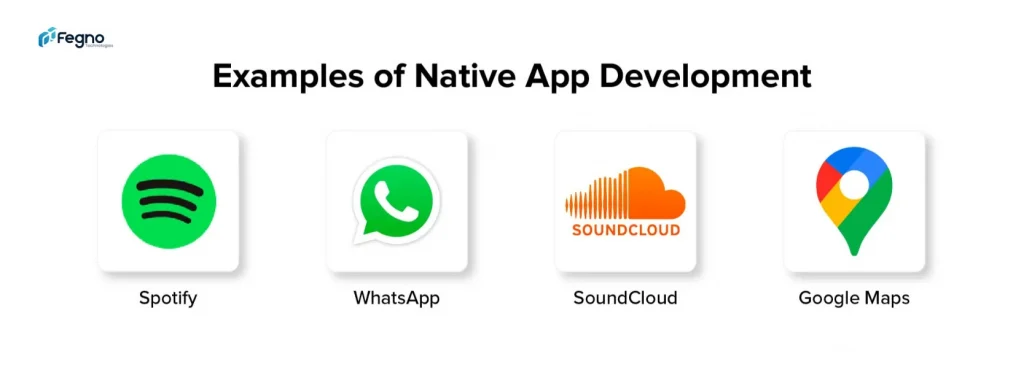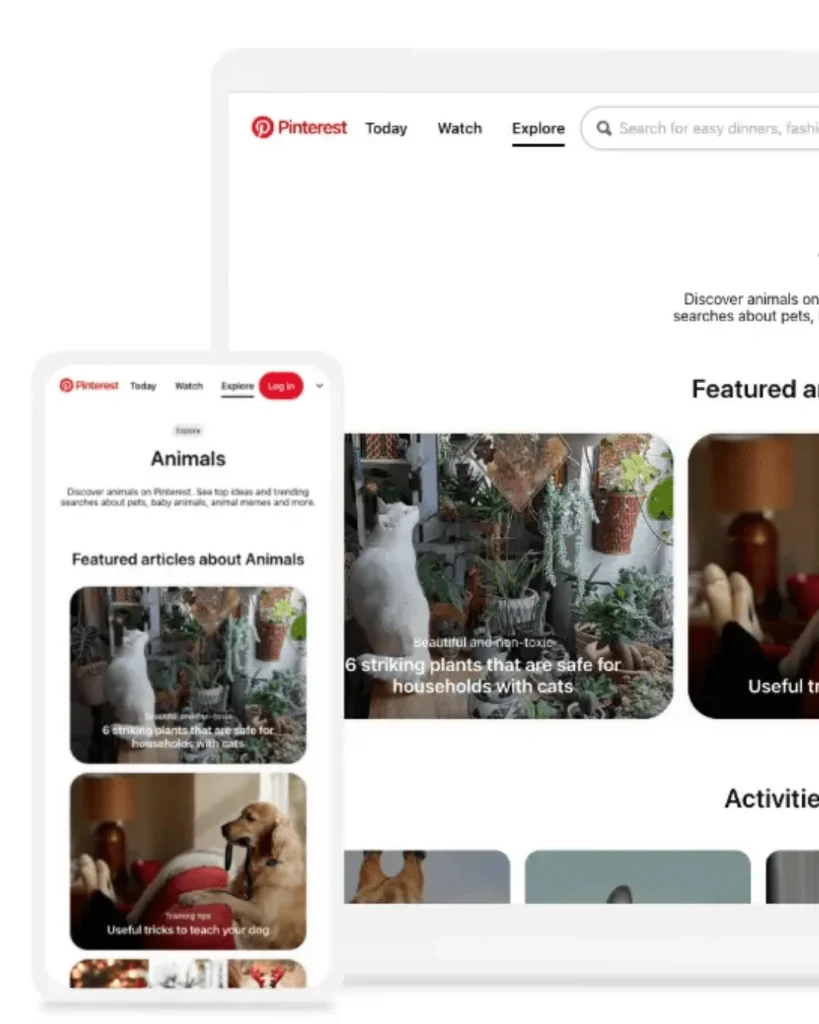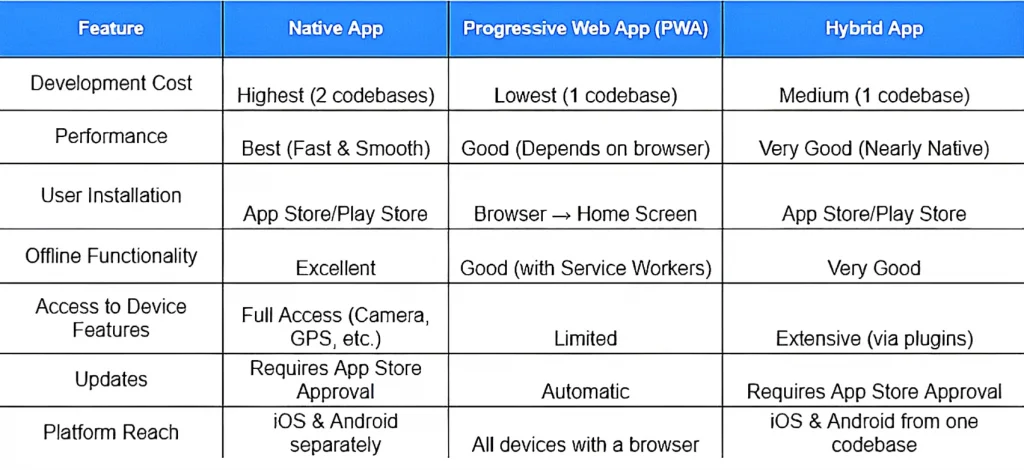
Having a mobile presence is essential in today’s digital age. But the biggest question we hear from business owners is: “What kind of app should I actually build?”
You’re likely choosing between a Native App, a Progressive Web App (PWA), or a Hybrid App. The right answer depends entirely on your business goals, budget, and the experience you want to deliver. For many, the decision often comes down to a choice between a PWA and some form of native, hybrid, or cross-platform app development.
Let’s keep things simple and break down these options to help you make the right decision for your business.
PWA vs Native vs Hybrid: What Should Local Businesses Choose?
Local businesses, whether it’s a bakery in Kochi or a spice shop in Thrissur, are eager to connect with customers through apps. However, there’s often confusion about which path to take. Should you invest in a fully native app, or will a leaner PWA suffice? Perhaps a hybrid or cross-platform app development approach is the answer.

What Is a Native App?
When you think of an app you download from the Apple App Store or Google Play Store, you’re thinking of a native app. These are built in two separate versions, one for iOS using Swift and one for Android using Kotlin.
The pros of building a native app: Performance and access. Native apps are incredibly fast and smooth. They have full access to your phone’s hardware, like the GPS, camera, and push notifications. This leads to a superior user experience.
The cons: This approach requires more time and a higher budget because you’re essentially building two apps.
Native is best for businesses that need top-tier performance. Think gaming, complex e-commerce, or any app that heavily relies on device features for offline use or real-time interactions.

What Is a PWA?
A Progressive Web App (PWA) is a website that acts and feels like a mobile app. Users can “install” it on their home screen from their browser, but it doesn’t live in an app store. It’s built with standard web technologies (HTML, CSS, JavaScript) and is essentially a single codebase for all devices.
Consider a local cafe in Kochi that wants a quick, installable menu and loyalty card system that their customers can access directly from their phone’s home screen. For this kind of project, a PWA is the perfect choice, as it delivers an app-like experience immediately, without the overhead and delay of app store submissions.
This is exactly the kind of challenge we specialize in. Our PWA development services in Kochi are designed to help local businesses build these fast, affordable mobile solutions to engage their customers effectively.

The pros of building a Progressive Web App: Speed and cost. PWAs are significantly faster and cheaper to develop and maintain. They update automatically, so users always have the latest version. PWAs are fantastic for “reach and discoverability” without the friction of an app store.
The Cons: There are limitations. PWAs have restricted access to device features. While they can use location and cameras, access to Bluetooth, advanced NFC, or certain sensors can be limited. Push notifications on iOS are also more restricted compared to native apps.
PWAs are best for content-driven sites, small businesses looking for a mobile presence, or anyone wanting to test a digital idea quickly and affordably.
What Is a Hybrid App?
A Hybrid App is essentially a web app wrapped in a native container. It’s built using web technologies like HTML, CSS, and JavaScript (often with frameworks like React Native or Flutter) and then packaged to be installed from app stores just like a native app.
The pros of building a Hybrid App: The biggest advantage is development efficiency. You write one codebase, and it runs on both iOS and Android, significantly reducing time and cost compared to building two separate native apps. It also maintains a presence in app stores and can access a wide range of device features through plugins.
The cons: While performance is excellent for most business applications, it may not match the raw speed and smoothness of a truly native app, especially for graphics-intensive tasks. You are also still dependent on app store approvals for updates.
Hybrid is best for businesses that need a feature-rich, app-store-distributable solution but have a moderate budget. It’s the ideal “middle ground” for many e-commerce platforms, productivity tools, and social applications.
Which Should You Choose for Your Local Business?
So, which path is right for you? Let’s make it simple.
Choose a PWA if: Your primary goal is reach and affordability. You want a mobile-friendly presence quickly, without app store hurdles. It’s perfect for restaurants with online menus, service businesses with booking forms, or blogs. You want to be found on Google and let users “install” your app with a single tap.
Choose a Native App if: Your primary goal is unbeatable performance and building user loyalty. If your app is core to your business (like a loyalty program, a complex e-commerce store, or a game) and needs to work flawlessly offline or use device features intensely, native is the way to go.
Consider a Hybrid App if: You need a “best of both worlds” solution. You want the single-codebase efficiency of a PWA but need the app store presence and wider device access of a native app. It’s a powerful compromise that delivers a near-native experience for a fraction of the cost of building two separate native apps.
Also read: React Native, Flutter, or KMP – Which Cross-Platform Framework Should You Choose?
There’s no one-size-fits-all answer. For many local businesses starting out, a PWA is a brilliant, low-risk entry point. As you grow and your needs become more complex, you can always evolve into a native or hybrid solution. If you’re looking for expert guidance to navigate this decision and build the right solution, partnering with us, experienced software development company in Kochi, Kerala, can help you transform your mobile strategy into a tangible, successful product.

Swalahu is a passionate Flutter Developer with 3 years of experience at Fegno Technologies, specializing in creating seamless, high-performance cross-platform mobile applications. He has contributed to delivering scalable, user-focused apps that enhance digital experiences. Always eager to grow, Swalahu actively explores emerging trends in app development.


 Schedule An Appointment
Schedule An Appointment